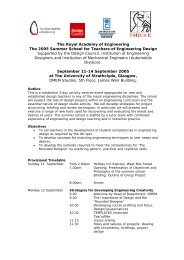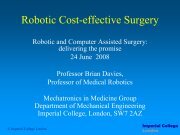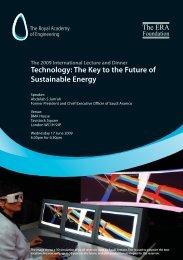Synthetic Biology: Public dialogue on synthetic biology
Synthetic Biology: Public dialogue on synthetic biology
Synthetic Biology: Public dialogue on synthetic biology
Create successful ePaper yourself
Turn your PDF publications into a flip-book with our unique Google optimized e-Paper software.
most comm<strong>on</strong> group, was related to “artificial”“unnatural” and “man-made” with<br />
nearly <strong>on</strong>e in seven (13%) resp<strong>on</strong>ses. This compares with nearly three in 10<br />
(29%) of US adults who menti<strong>on</strong>ed that <strong>synthetic</strong> <strong>biology</strong> was something<br />
“man-made”, “artificial”, “fake”, “not natural” or “not real”. This was also a str<strong>on</strong>g<br />
theme in the UK public <str<strong>on</strong>g>dialogue</str<strong>on</strong>g> meeting. Some 4% of resp<strong>on</strong>dents to the<br />
survey, and the <str<strong>on</strong>g>dialogue</str<strong>on</strong>g> participants also said something related to man-made<br />
materials or fibres.<br />
The sec<strong>on</strong>d most comm<strong>on</strong>ly cited set of words and phrases in the UK survey<br />
was related to genetics, cl<strong>on</strong>ing or embryos. Nearly <strong>on</strong>e in ten (9%) said<br />
something related to these topics, which is identical to the US survey. Cl<strong>on</strong>ing<br />
and genetic modificati<strong>on</strong> of embryos was also discussed by participants in the<br />
<str<strong>on</strong>g>dialogue</str<strong>on</strong>g> meetings as likely to be in some way related to <strong>synthetic</strong> <strong>biology</strong>.<br />
Resp<strong>on</strong>dents to the survey were also asked ‘What do you think <strong>synthetic</strong><br />
<strong>biology</strong> might be? ’ The resp<strong>on</strong>ses were very similar to resp<strong>on</strong>ses to the<br />
previous questi<strong>on</strong> that was asked, including the percentage of d<strong>on</strong>’t knows<br />
and nothing (49%). There were however, a few differences in resp<strong>on</strong>ses to<br />
these two questi<strong>on</strong>s that are worthy of menti<strong>on</strong>.<br />
Some 6% of resp<strong>on</strong>dents to the ‘what do you think <strong>synthetic</strong> <strong>biology</strong> might<br />
be?’ questi<strong>on</strong> stated that it had something to do with transplanting <strong>synthetic</strong> or<br />
animal body parts into humans.<br />
The c<strong>on</strong>cept of ‘transplantati<strong>on</strong>’ was also raised by the <str<strong>on</strong>g>dialogue</str<strong>on</strong>g> participants<br />
who associated <strong>synthetic</strong> <strong>biology</strong> with human tissue/ parts replacement such<br />
as “new [heart] valves and things like that” or “artificial legs”, “pace-makers” or hip<br />
replacements, <strong>synthetic</strong> blood, skin and cosmetic surgery.<br />
The <str<strong>on</strong>g>dialogue</str<strong>on</strong>g> participants also c<strong>on</strong>sidered the c<strong>on</strong>cept of ‘replacement’ in terms<br />
of developing new materials, including those that were in short supply, such as<br />
fuels.<br />
“Fuel is getting more scarce and it’s <strong>synthetic</strong> fuel, obviously that’s the thing<br />
that they’re looking at nowadays”.<br />
Male<br />
New medicines or ways of producing medicines were also menti<strong>on</strong>ed by those<br />
who took part in the <str<strong>on</strong>g>dialogue</str<strong>on</strong>g> meetings and a small proporti<strong>on</strong> of the survey<br />
resp<strong>on</strong>dents.<br />
There were also some associati<strong>on</strong>s with food processing, crop spraying and GM<br />
foods which were raised by some of the women who took part in the <str<strong>on</strong>g>dialogue</str<strong>on</strong>g><br />
meetings. It was suggested that while medical applicati<strong>on</strong>s impacted <strong>on</strong> <strong>on</strong>e<br />
individual at a time, the c<strong>on</strong>sequences of an error with food modificati<strong>on</strong><br />
would impact negatively <strong>on</strong> a large number of people at <strong>on</strong>ce. The<br />
importance of the scale of the impact is returned to in secti<strong>on</strong> 6.<br />
The women also menti<strong>on</strong>ed that they associated the term with ‘alive’ and<br />
‘living’.<br />
“I meant a living being, or a plant or something, something that’s alive, you<br />
know that’s what I associate <strong>biology</strong> with.”<br />
Female<br />
The survey also showed that 4% of survey resp<strong>on</strong>dents related the term<br />
20 The Royal Academy of Engineering

















